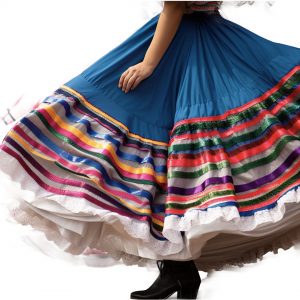Historical & Current Events dictionary
National Hispanic Heritage Month
or Hispanic Heritage Month [ hi-span-ik her-i-tij muhnth ]
What is National Hispanic Heritage Month?
National Hispanic Heritage Month is a monthlong observance in the US in celebration of the cultures, contributions, and lives of people with Hispanic and Latin American heritage.
This encompasses a diverse group of identities, including people with a heritage rooted in Central and South America, Mexico, the Caribbean, and Spain.
It can involve those who identify as Hispanic, Latino or Latinx, and in other, more specific ways, such as Mexican American. The word Hispanic is typically used to describe people with a heritage rooted in Spanish-speaking Latin America. The word Latino typically refers to people of Latin American origin or descent. The word Latinx is used as a gender-neutral alternative to Latino, but it’s important to remember that not everyone with this heritage prefers to use this term.
The month is often observed with festivals and events showcasing the cultures of the people it celebrates.
🗓 When is National Hispanic Heritage Month?
National Hispanic Heritage Month takes place every year from September 15 to October 15.
Where does National Hispanic Heritage Month come from?

The push to celebrate the contributions of the people that National Hispanic Heritage Month honors grew out of the Civil Rights Movement of the 1960s. The observance was first celebrated in 1968 as Hispanic Heritage Week. It was officially expanded to a full month in 1988.
Why is National Hispanic Heritage Month celebrated starting on September 15?
Most observance months occur entirely within a calendar month, but National Hispanic Heritage Month straddles two. Its timing has to do with Latin American history. September 15 was chosen as the start of the observance because it’s the anniversary of independence for the Central American Nations of Costa Rica, Nicaragua, El Salvador, Honduras, and Guatemala. Many other significant dates fall within the month. Mexico celebrates independence on September 16, and Chile celebrates independence on September 18. Belize celebrates its independence on September 21. October 12 is the day known as Día de la Raza, on which many Latin Americans celebrate their heritage. (Its date is the anniversary of the day Christopher Columbus reached the Americas, but it is often seen as an alternative to Columbus Day).
Learn more about Hispanic heritage by reading about important and relevant topics like the difference between Hispanic vs. Latino, Indigenous People’s Day vs. Columbus Day, and the history and significance of Cinco de Mayo.
The legacy of (especially Spanish) colonialism throughout the region is often discussed during National Hispanic Heritage Month, which also often serves as a time to reflect on, raise awareness of, and work to address and dismantle the racism and discrimination faced by the people the month honors.
Examples of National Hispanic Heritage Month
More information and context on National Hispanic Heritage Month
Did you know … ?
- According to data from 2019, people who identify as Hispanic are the largest ethnic minority in the US.
- The word Hispanic is specifically used in relation to heritage from countries where Spanish is spoken, so someone from Brazil, for example, wouldn’t identify as Hispanic because the dominant language there is Portuguese.
What are other words used in discussion of National Hispanic Heritage Month?
Note
This is not meant to be a formal definition of National Hispanic Heritage Month like most terms we define on Dictionary.com, but is rather an informal word summary that hopefully touches upon the key aspects of the meaning and usage of National Hispanic Heritage Month that will help our users expand their word mastery.